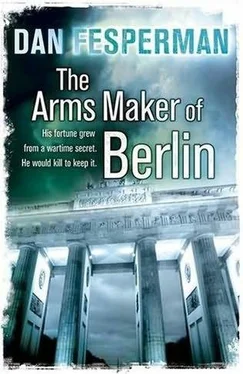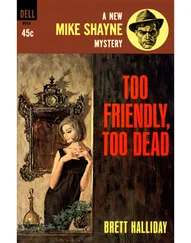Dan Fesperman - The Arms Maker of Berlin
Здесь есть возможность читать онлайн «Dan Fesperman - The Arms Maker of Berlin» весь текст электронной книги совершенно бесплатно (целиком полную версию без сокращений). В некоторых случаях можно слушать аудио, скачать через торрент в формате fb2 и присутствует краткое содержание. Жанр: Триллер, на английском языке. Описание произведения, (предисловие) а так же отзывы посетителей доступны на портале библиотеки ЛибКат.
- Название:The Arms Maker of Berlin
- Автор:
- Жанр:
- Год:неизвестен
- ISBN:нет данных
- Рейтинг книги:5 / 5. Голосов: 1
-
Избранное:Добавить в избранное
- Отзывы:
-
Ваша оценка:
- 100
- 1
- 2
- 3
- 4
- 5
The Arms Maker of Berlin: краткое содержание, описание и аннотация
Предлагаем к чтению аннотацию, описание, краткое содержание или предисловие (зависит от того, что написал сам автор книги «The Arms Maker of Berlin»). Если вы не нашли необходимую информацию о книге — напишите в комментариях, мы постараемся отыскать её.
The Arms Maker of Berlin — читать онлайн бесплатно полную книгу (весь текст) целиком
Ниже представлен текст книги, разбитый по страницам. Система сохранения места последней прочитанной страницы, позволяет с удобством читать онлайн бесплатно книгу «The Arms Maker of Berlin», без необходимости каждый раз заново искать на чём Вы остановились. Поставьте закладку, и сможете в любой момент перейти на страницу, на которой закончили чтение.
Интервал:
Закладка:
The second knock was firmer, but still not what you would call insistent. But when Dieter’s mother threw open the door, four men in black SS uniforms entered, three with guns drawn. The first one carried some sort of official-looking paper, and he spoke sternly as everyone else went silent. Liesl eased to Kurt’s side and took his hand.
“Frau Büssler, I am here to inform you that all of these young people are under arrest for crimes against the state.”
Someone dropped a glass.
“No!” Liesl cried.
“Stay calm,” Kurt whispered, finally able to muster some bravery now that he knew roughly what was coming next.
Dieter’s mother clapped a hand to her mouth. His father had appeared in the hallway, pipe in hand, too stunned to speak.
Christoph Klemm, always the boldest in the bunch, charged toward a window. One of the officers struck him on the head with a sidearm. There was a sickening crack, and Christoph slumped to the floor.
The group’s commander looked too thin for his uniform. It was baggy at the shoulders and the waist, and his belt had been tightened a few extra notches to hold up his bunched trousers. Maybe he, too, wasn’t getting enough to eat, or perhaps the fittest members of his unit had been sent to the front. Kurt felt oddly offended that they were being arrested by such a second-rate bunch. Or maybe he already knew he would vividly remember every detail of this moment-the shocked faces and deathly silence, the way that the shred of ham he had eaten seemed to be twisting in his stomach like a parasite.
“This needn’t be difficult,” the officer said. “All of you place your hands on your head and line up against the opposite wall.”
“Are you going to shoot us?” Dieter asked, almost in a shriek.
“Shut up, Dieter.” It was Christoph, rising unsteadily. His lower lip was bleeding, and a lump was visible below his right ear. He swayed a bit, still woozy.
Everyone moved toward the wall, Kurt following numbly as they crowded together, elbows bumping like antlers above their heads, a meek herd. Thinking about this moment in the abstract had been bad enough. Now, with the menacing black uniforms and Dieter’s mother sobbing uncontrollably, it was worse than he had imagined. Nor did it help that he suddenly found himself wondering whether his family could have toughed it out, even if he had taken no action. He was angry at himself. The heat boiled up in his cheeks, and he clenched his fists. Liesl noticed and whispered in alarm.
“Don’t try anything, Kurt. It’s not worth it. Maybe it will be nothing.”
“Quiet!” the commander shouted.
Kurt stared back at her, mute with rage and self-loathing. A hand shoved him roughly, and he fought down an impulse to strike back. It wasn’t that he feared retaliation. His real worry was that if he resisted, the commander would single him out, here and now, and reveal his duplicity to all. Then his efforts really would have gone for nothing.
There was a sudden sound of a body collapsing to the floor. Kurt glanced over his shoulder to see Christoph in a heap.
“Stay away from him,” the commander said mildly to Dieter’s mother, who had stepped forward in concern. Then, to his men: “Take him out to the truck.”
Hannelore turned abruptly and spat at one of the soldiers, who shoved her hard against the wall. She cried out in pain and anger. Kurt caught her eye, and for a second he was certain she could read his every thought, so he blushed and looked away.
An officer emerged from the hallway, shouldering roughly past Dieter’s father and holding aloft a small stack of White Rose pamphlets.
“These were beneath the boy’s mattress.”
Had Dieter really been so stupid? Hannelore shook her head and cursed under her breath. Shortly afterward the officers led them outside, where a military truck had pulled to the curb with its tailgate down and its canvas flaps open in the back.
“Climb aboard, one at a time,” the commander said. “Slowly and orderly, while keeping your hands above your head.”
Neighbors had gathered on the sidewalk. There was concern in their faces, but also shame. Guilt by proximity. You could almost sense them calculating what this might mean for their own prospects in the future.
Two soldiers with rifles climbed into the truck and closed the tailgate and the canvas flaps, plunging everyone into darkness. The truck pulled away. Kurt peered through the slit between the flaps and saw a passing tram. The only light visible was from the blue sparks in the overhead wires.
They were seated three to a side in the bed of the truck, with Christoph curled in the middle like a sack of flour.
“Where are we going?” someone asked.
No one answered.
The ride continued for twenty minutes. When they finally stopped, bright lights were switched on and someone shouted an order. It sounded as if a gate was being opened. The truck bumped forward. Kurt saw a brick wall topped by barbed wire.
“I know where we are,” Hannelore whispered. “Plötzensee Prison.”
Kurt had known this was their destination, but somehow it didn’t make the arrival any easier to bear. Liesl took his hand in the dark, and for the first time in days he was able to muster some courage. He even allowed himself to begin thinking about their future. Maybe this would be the low point, he told himself. In four months, perhaps five, the worst would be over. Make it through this ordeal and he would still have Liesl, trusting him, touching him. And surely they would still be together years later as well. If so, then it would all be worth it.
The truck stopped again. A guard threw down the tailgate and pulled back the flaps. They were staring at an open door leading into a brick cellblock.
His life in prison had begun.
THE FIRST LETTER from Liesl arrived a week later, five handwritten pages smuggled between their cells by a guard bribed with ration coupons from her family. It was Kurt’s first moment of joy and color in a drab world that had shrunk to the dimensions of his five-by-nine cell.
Kurt had entered a sort of hibernation. It hadn’t even occurred to him to try to communicate with the others-not that he would have been inclined to do so except in Liesl’s case. The less they knew of his guilty thoughts, the better.
So he passed the time reading books sent by his parents. He was mildly amused when his sister forwarded her worn copy of The Sorrows of Young Werther, which he was able to read with a certain detachment, taking comfort in the knowledge that he, unlike Werther, might still win his true love in the end.
At other times he stared longingly out his small, high window for hours on end. The view across the prison’s outer wall was of the Hohenzollern Canal, the waterway leading to the loading docks of the biggest Bauer factory. Sometimes he smelled the smoke from the factory as it drifted on the afternoon breeze. At least that meant it was still functioning-no sure thing judging from the frequency of the bombing raids. Almost every night now the sky filled with the beams of searchlights. Whenever the pounding of the explosions and the flak bursts finally stopped, there was always plenty of chatter from the other cells. Some of it was in foreign tongues, usually French or Polish. Kurt never tried answering, even when the words were in German.
Liesl, on the other hand, had obviously been working diligently to establish connections to all their friends. This was clear from the surprising wealth of information in her letter. Some of the news was hard to take.
Dearest Kurt,
I suppose by now that you, too, have suffered the awful and degrading experience of interrogation at the hands of our captors. Yesterday I was made to stand for five hours in the middle of a room while a guard watched through the door. I pissed into my clothes and nearly fainted. The only break they allowed was for a glass of water, but even then I was not permitted to sit down, and of course this only caused me to piss again. Afterward they did not let me wash or change clothes, so as you can imagine I am quite impossible to be around. Even the guard seems to grimace as he passes my door.
Читать дальшеИнтервал:
Закладка:
Похожие книги на «The Arms Maker of Berlin»
Представляем Вашему вниманию похожие книги на «The Arms Maker of Berlin» списком для выбора. Мы отобрали схожую по названию и смыслу литературу в надежде предоставить читателям больше вариантов отыскать новые, интересные, ещё непрочитанные произведения.
Обсуждение, отзывы о книге «The Arms Maker of Berlin» и просто собственные мнения читателей. Оставьте ваши комментарии, напишите, что Вы думаете о произведении, его смысле или главных героях. Укажите что конкретно понравилось, а что нет, и почему Вы так считаете.












